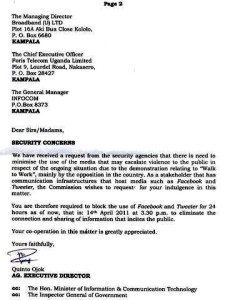I posted about this yesterday, but I just put together a longer piece for Global Voices in which I’ve tried to give a bit more context for the protests:
As opposition politicians and others angry over rising fuel and food prices in Uganda continue to stage walk to work protests against the current regime, the government is asking Internet service providers (ISPs) to shut down access to Facebook and Twitter.
According to the World Bank, a lengthy drought and a spike in fuel prices are wreaking havoc across East Africa. In Uganda, Timothy Hatcher at aaralinuga describes the situation:
Inflation has pretty much doubled over the past month to 11.1 percent, and fuel prices have risen by over 50 percent; prices are approaching $7.00 per gallon. Major impact: prices of some staple foods have tripled since December.
Angela Kintu explains how higher prices are affecting families:
…this protest is about reality, frustration and desperate times. I am buying a litre of Ugandan made and grown cooking oil for sh6,500 [$2.73]. I am paying sh3,600 [$1.51] for a litre of fuel. A tomato has gone up to sh300 [$0.12] at the very least. I don’t know about you, but that is breaking my budget. No one is paying me any more money for my work – in fact, I am chasing debtors left, right and centre. In one short week, Easter and school holidays will be upon me. Three short weeks after that, I must rustle up school fees and requirements.
These economic issues have provided a foothold for opposition leaders who have struggled to garner support since losing the February 2011 presidential election to long-time incumbent Yoweri Museveni.
Read the full post: Uganda: Government Attempts to Block Facebook, Twitter as Protests Continue
